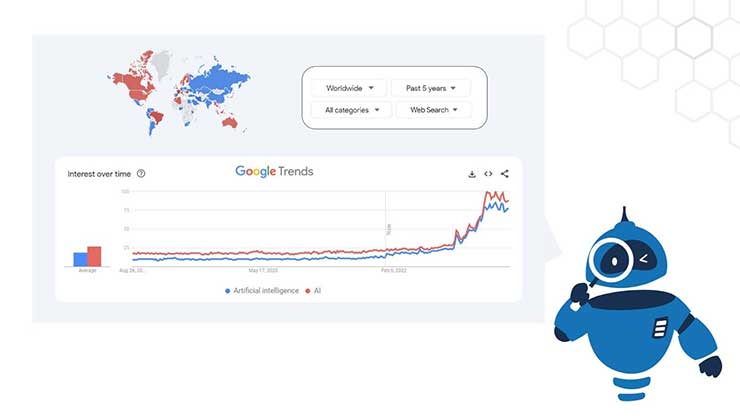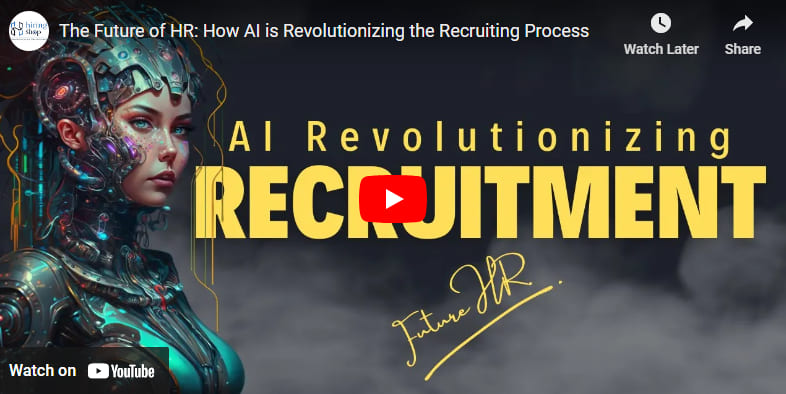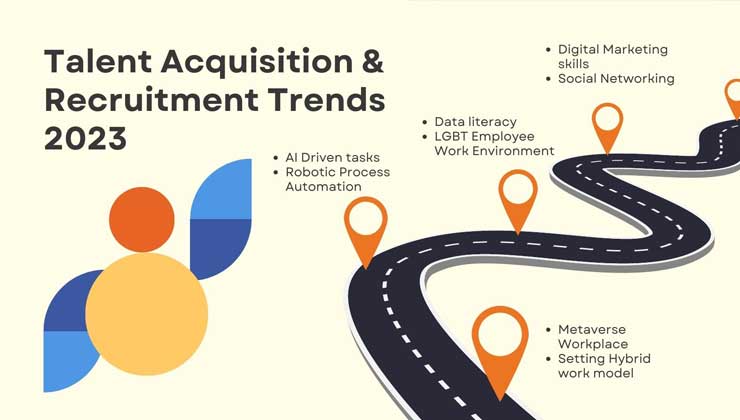AI or Artificial Intelligence is one of the most trending topics in recent years. It
means implementing intelligent software or machines designed, developed and trained(feeding data) by humans to
automate human work.
Artificial Intelligence is engaged in almost all fields, from auto-driving cars to AI robots performing critical
surgeries.
Fields, where humans do similar and repetitive tasks are more likely to be influenced by AI, where an AI can
replace/assist humans.
So far, AI in Recruitment has done a great job. AI takes care of tasks like screening resumes from the database,
scheduling interviews, parsing information from CVs and jobs, etc.
As a baseline, you need to understand various aspects of Recruitment, where AI can take over humans and where AI
cannot perform without human support. Let's dive deep into some real stats from
the Google tool.

Google Trends graph is showing growth of search queries "Artificial Intelligence" and
"AI" over 5 years.
The graph shows that there has been a drastic change in "AI" related keyword searches
on Google in the last 1-2 years.
That means soon, AI will take care of a major part of the work/tasks done by humans.
But in parallel, this is also true that AI is not as intelligent as humans and hence needs human intervention
and supervision.
Let's understand the impact of AI on the Recruitment Landscape.
-
AI in Recruitment:
Artificial Intelligence's involvement via smart software or robots that perform tasks after
analyzing input and making decisions to give desired output for the hiring workflow is AI in recruitment. Based on the
development that happened till date, it's possible to automate more than 30-40% of the recruitment work process we were
following.
Let us discuss this.
A typical process followed in Recruitment involves 1 → Identifying needs,
2→ Preparing JD, 3→ Talent search, 4→ Screening and shortlisting, 5→Interviewing
(scheduling
and conducting), 6→ Evaluation and offer for employment, 7→ Induction of new employee.
1st, 6th and 7th are completely taken care by human where 2nd, 3rd, 4th and 5th
are partially handled by AI and Humans.
Slowly and gradually, humans will make the process driven by AI. So, humans can be
more productive and focussed on other necessary tasks rather than just Recruitment.
-
Benefits of using AI:
In the above example, we understand how AI is helping in offloading HR's recruitment
work by just taking care of JD creation with a little input. Parsing information from CVs based on job
descriptions and requirements. Shortlisting resumes based on experience and scheduling interviews via
automated
calls, emails and SMSs.
Major merits of Using Artificial Intelligence at Work.
- A human can screen 100-200 resumes daily, but AI can
scan thousands in a couple of hours.
- An HR recruiter can make a limited number of
calls/emails/SMS, whereas AI can make hundreds of calls/Emails/SMS in a fraction of a second.
- A group of HRs can create a few job description pages,
whereas AI can create detailed and customized jo6b descriptions within seconds and in just a few words of
command.

AI helps reduce the time and cost per hire for the organization. Here are a few more
benefits of onboarding AI into the recruitment landscape.
- Improve the quality of hiring
- Reduce average hiring time
- A higher degree of relevance
- Improve hiring quality
- Save cost
- Overall productivity improvement of the team
-
Demerits of AI in Recruitment
Nothing comes with all positive aspects. There are Issues or challenges in applying
AI in Recruitment.
- Not fully developed as it is in its initial
stages.
- Partial support is available.
- Facing a lack of workforce developing AI-enabled
softwares and technologies.
- Developing AI-powered software needs a good amount of
investment.
- May need huge amounts of data to train AI and build
intelligence around the requirement.
- Not feasible for small businesses.
- It May be biased in the hiring process.
-
Latest Trends and Future in AI for the recruitment landscape
With the advancement in technology and data analysis, AI has become an invaluable
tool and streamlining and enhancing the recruitment landscape. AI did a good job of reducing the time and
cost
per hire.
So far, AI is working in
- various resume screening from databases.
- Job description creation,
- Information retrieval of potential candidate's public
profile
- creating documents
- help in analyzing the HR matrix etc.
- Hiring Process
- Performance racking
- Onboarding process
- Training and Development
- Employee engagement
A couple of HR consultancies are working on implementing Artificial Intelligence in
their recruitment process. One of them is HiringShop. Currently, they are working on video interviewing a
candidate to screen candidates at the initial stages. Thus it can save human time.
The latest trends are
- Auto task assigning,
- Chatbot creation,
- AI-driven voice assistance,
- AI-powered video interviewing and more.
- The software is now capable of assigning jobs to
recruiters based on the skills they have.
- Automatically preparing their performance
report.
- Predicting attrition based on the organization's
internal trend.
Friquently Asked Questions
Yes, AI can create a generic or customized job description based on input. If you have a custom
requirement to be mentioned in the JD, you can simply add them to the input. For example, create a job description for an HR role where the highest package is 5.5LPA, and the minimum experience should be at least 1 year.
No, so far, AI is incapable of making Complex decisions, handling sensitive employee
issues, understanding the nuances of company culture etc Rather, it is important to have a blend of AI and
human expertise to manage HR functions effectively.
Ai can assist HR in many ways, like answering questions related to Recruitment,
creating documents, recruitment support, data analysis, policy development, employee engagement etc.
The exact percentage or calculation is different for different sectors. Here are a
few considerations that can be kept in mind to calculate.
- Information retrieval - AI can
shorten the time and give output in a few minutes or hours.
- Document creation - AI can generate
documents like offer letters based on custom inputs, emails, policies etc.
- Resume screening - is where HR spends
most of the time, and here AI can drastically reduce the time by 60-70%.
- Efficiency - reducing the time spent
on basic tasks, HR professionals can focus on strategic and high-value tasks that will contribute directly
to the company's goal
Watch the video to see how the famous AI chatbot ChatGPT answers the
questions.











